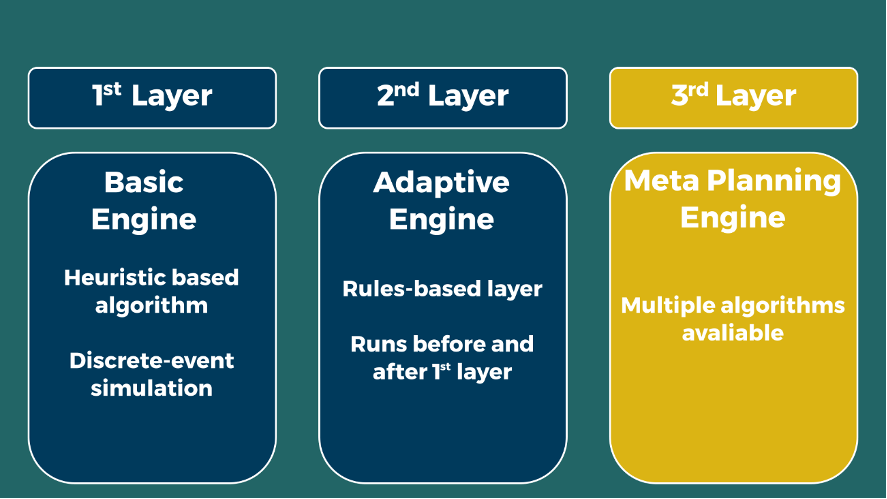The Adaptive Engine’s role within Rail Movement Planner™
Know the Adaptive Engine, one of the Rail Movement Planner™ layers: improving your planning with your rail network’s specificities
The railroad is a living organism and cannot stop. Each rail network has its own specific features, and organizing its complex system requires thorough planning, facilitated by using Rail Movement Planner™. Our system plans train traffic in real time through three layers, Adaptive Engine among them.
Rail Movement Planner™ at its core has planning algorithms that function much like the brains devising railroad traffic plans, and the Adaptive Engine is one of the planning steps that make the difference to decision making.
Check our article and understand how Rail Movement Planner™ and the Adaptive Engine support daily problem solving in railroads.
Adaptive Engine in planning architecture
Among the Adaptive Engine’s roles in rail network optimization, adhering to operational rules and procedures reduces incidents and ensures smooth daily functioning without unnecessary risks. These are key features for railroad safety and its operational regularity.
To better understand the Adaptive Engine’s function, it’s critical to talk about Rail Movement Planner™, our highly flexible real time train traffic planning solution. The system stems from three “brains” that compose the software’s architecture, named Basic Engine, Adaptive Engine and the Meta-Planning Engine, as displayed below.

The first planning layer, Basic Engine, has the role of producing quick traffic plans, always considering railroad traffic planning’s best practices. This is made possible from precise strategies that reduce decision making time, given crossing times and meet-and-pass scenarios on the rail network.
However, the Meta Planning Engine, as the last layer, considers different approaches and alternative heuristics to devise distinct traffic plans. It calculates parallel plans by using different sets of rules and conditions, proposing changes to planning propositions. All striving toward optimization. We can consider this planning layer in Rail Movement Planner™ as a supervisor whose function is considering unorthodox approaches to rail traffic problems.
And it’s beyond immediate objectives that the crucial Adaptive Engine contributions emerge. In this middle layer, specific operational rules and planning scenarios are the focus. It’s direct action over the initial traffic plan, changing conditions and adding rules and priorities according to what the controller needs.
The Adaptive Engine acts much like a railroad specialist when overwriting heuristics – or fundamental propositions – from the Basic Engine with decisions more adherent to the operations’ demands in that moment. It guides the planning process, considering the presented solutions and suiting them into any existing scenario.
Together, these “three digital brains” ensure traffic plans are devised quick and efficiently, always adherent to operational objectives.
Adaptive Engine benefits
The Adaptive Engine allows the insertion of any kind of operational rule or informal instruction followed by controllers in Rail Movement Planner™. Thus, the software can absorb and interpret any integrated system’s data correctly.
Given the constant pressure in the Control Center, it’s common that controllers opt for safer and tested approaches when solving incidents. However, such experiments and the daring to try new hypotheses bring potential increments to efficiency in an operation. Additionally, with the Adaptive Engine, the required time and effort to make such tests, enabling them.
With that in mind, stoppage in inadequate locations or incidents with serious impacts on the current traffic plan can be avoided. Meaning more operational regularity and safety for your railroad.
Rail Movement Planner™ can be integrated as a high-performance tool, readily consolidating, and dispatching automated information and traffic plans, or even as a parallel solution to validate plans and testing alternatives in real time.
To know more about Rail Movement Planner™ and its Adaptive Engine, browse our website and learn all about what’s modern and efficient to your rail network!
















